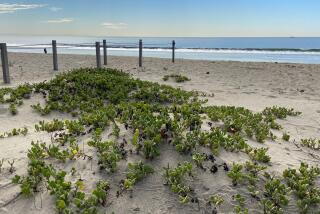Beach erosion from Ike may make homes illegal
Even people whose coastal houses were spared by Hurricane Ike could see them condemned under a little-known Texas law, and hundreds whose beachfront homes were wrecked could be barred from rebuilding there.
Now here’s the saltwater in the wound: It could be a year before the state tells these homeowners what they may or may not do. And if these homeowners do lose their beachfront property, they may get no compensation from the state.
The reason: the 1959 Texas Open Beaches Act. Under the law, the strip of beach between the average high-tide line and the average low-tide line is considered public property, and buildings are illegal there.
Over the years, the state has repeatedly invoked the law to seize houses in cases where a storm eroded a beach so badly that a home was suddenly sitting on public property. The aftermath of Ike could see the biggest such use of the law in Texas history.
“I don’t like it one bit,” said Phillip Curtis, 58, a Dallas contractor who owns two homes -- a $350,000 vacation home and a $200,000 rental -- on Galveston Island’s Jamaica Beach. “I think the state should allow us to try to save the houses. I don’t appreciate the state telling people, ‘Now it belongs to us.’ It breaks your heart.”
The former state senator who wrote the law had little sympathy.
“We’re talking about damn fools that have built houses on the edge of the sea for as long as man could remember and against every advice anyone has given,” A.R. “Babe” Schwartz said.
Ike’s 110-mph winds, storm surge of 12 feet and waves that measured as high as 26 feet obliterated the 4- to 6-foot dunes and redrew the tide lines along a broad stretch of the Texas Gulf Coast.
Texas General Land Commissioner Jerry Patterson, a Republican whose office is responsible for policing the beaches, said he saw hundreds of houses in jeopardy of being declared unlawful as he flew over the coastline in the last week.
“And those are the ones still standing,” he said. Other homes, he said, were reduced to pilings jutting out of the sand or water.
Patterson said no decision on whether homeowners could continue living there would be made for at least a year, while authorities watch the ever-shifting boundaries of the beach. “You want to have at least a complete all four seasons and find out what Mother Nature is actually going to do until she finishes what she’s going to do,” he said.
That could put homeowners in a bind. Many may be afraid to spend money on home repairs if there is a chance the state is going to condemn their property.
Those whose homes were destroyed can collect insurance. But it is unclear whether those whose undamaged homes are condemned under the Texas law will get any compensation, from the state or anyone else. Land Office spokesman Jim Suydam said the agency used to offer people up to $50,000 to move, but he didn’t know if that fund still existed.
Rebuilding the eaten-away beaches does not appear to be an option. Schwartz said that the Gulf of Mexico does not deposit sand on Galveston Island and other nearby beaches, and that trucking in huge amounts of sand would not work, because storms would just wash it away within a year or two.
The law was enacted when there were far fewer houses on the Texas coast. In fact, there are lot more houses on the coast now than there were in 1983, during Hurricane Alicia, the last time the law was invoked against large numbers of homeowners. Many of the beach homes on Galveston and other nearby beaches are second homes, many of them rather modest.
Schwartz said the area’s homeowners should not be surprised.
“Every one of them was warned of that in their earnest-money contract, in the deed they received, in the title policy they bought,” he said. “And whether you like it or not, neither the Constitution of the United States nor the state of Texas nor any law permits you to have a structure on state-owned property that’s subject to the flow of the tide.”
California and Oregon have similar laws.
“No one has ever successfully beaten the state when the state comes after you under the Open Beaches Act,” said Charles Irvine, a Houston coastal law attorney. “But everyone still tries to think up innovative arguments.”
Susan Holman, 60, of Dallas, owns a house with her brother on Pirate’s Beach on Galveston Island. Her parents built it 25 years ago as a vacation home. The home is intact but the water’s edge is now close, meaning the house could be seized. “Until we know more, I’m not going to worry about something that hasn’t happened,” she said. But she added: “If that did happen, it would break our hearts.”
--
Graczyk reported from Houston and Burdeau from Galveston. Associated Press writer Monica Rhor in Houston contributed to this report.
More to Read
Start your day right
Sign up for Essential California for news, features and recommendations from the L.A. Times and beyond in your inbox six days a week.
You may occasionally receive promotional content from the Los Angeles Times.






